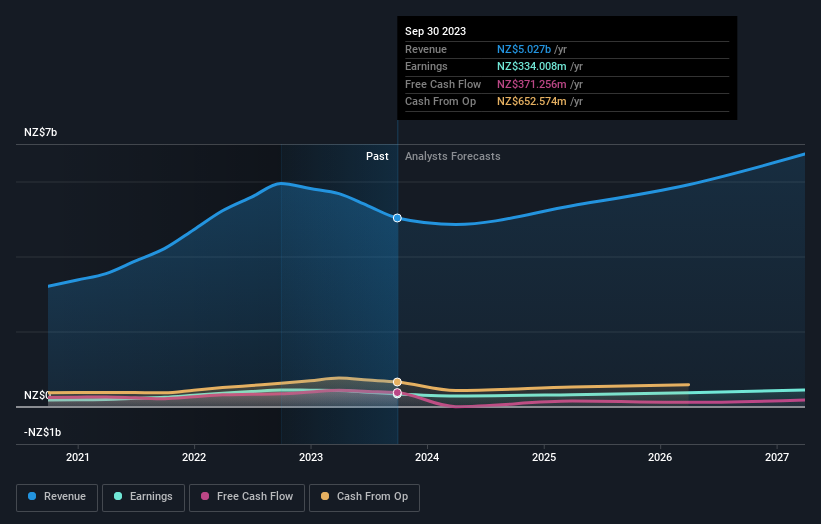Institutions own 33% of Mainfreight Limited (NZSE:MFT) shares but retail investors control 49% of the company
Key Insights
Significant control over Mainfreight by retail investors implies that the general public has more power to influence management and governance-related decisions
The top 25 shareholders own 49% of the company
If you want to know who really controls Mainfreight Limited (NZSE:MFT), then you'll have to look at the makeup of its share registry. And the group that holds the biggest piece of the pie are retail investors with 49% ownership. Put another way, the group faces the maximum upside potential (or downside risk).
And institutions on the other hand have a 33% ownership in the company. Generally speaking, as a company grows, institutions will increase their ownership. Conversely, insiders often decrease their ownership over time.
Let's take a closer look to see what the different types of shareholders can tell us about Mainfreight.
Check out our latest analysis for Mainfreight
What Does The Institutional Ownership Tell Us About Mainfreight?
Many institutions measure their performance against an index that approximates the local market. So they usually pay more attention to companies that are included in major indices.
We can see that Mainfreight does have institutional investors; and they hold a good portion of the company's stock. This suggests some credibility amongst professional investors. But we can't rely on that fact alone since institutions make bad investments sometimes, just like everyone does. If multiple institutions change their view on a stock at the same time, you could see the share price drop fast. It's therefore worth looking at Mainfreight's earnings history below. Of course, the future is what really matters.
We note that hedge funds don't have a meaningful investment in Mainfreight. Our data suggests that Bruce Plested, who is also the company's Top Key Executive, holds the most number of shares at 15%. When an insider holds a sizeable amount of a company's stock, investors consider it as a positive sign because it suggests that insiders are willing to have their wealth tied up in the future of the company. With 4.8% and 3.3% of the shares outstanding respectively, Fisher Funds Management Limited and JPMorgan Chase & Co, Private Banking and Investment Banking Investments are the second and third largest shareholders. Additionally, the company's CEO Donald Braid directly holds 2.9% of the total shares outstanding.
A deeper look at our ownership data shows that the top 25 shareholders collectively hold less than half of the register, suggesting a large group of small holders where no single shareholder has a majority.
Researching institutional ownership is a good way to gauge and filter a stock's expected performance. The same can be achieved by studying analyst sentiments. There are a reasonable number of analysts covering the stock, so it might be useful to find out their aggregate view on the future.
Insider Ownership Of Mainfreight
While the precise definition of an insider can be subjective, almost everyone considers board members to be insiders. The company management answer to the board and the latter should represent the interests of shareholders. Notably, sometimes top-level managers are on the board themselves.
Most consider insider ownership a positive because it can indicate the board is well aligned with other shareholders. However, on some occasions too much power is concentrated within this group.
Our information suggests that insiders maintain a significant holding in Mainfreight Limited. It has a market capitalization of just NZ$6.8b, and insiders have NZ$1.3b worth of shares in their own names. That's quite significant. Most would say this shows a good degree of alignment with shareholders, especially in a company of this size. You can click here to see if those insiders have been buying or selling.
General Public Ownership
The general public, who are usually individual investors, hold a 49% stake in Mainfreight. While this group can't necessarily call the shots, it can certainly have a real influence on how the company is run.
Next Steps:
It's always worth thinking about the different groups who own shares in a company. But to understand Mainfreight better, we need to consider many other factors.
I always like to check for a history of revenue growth. You can too, by accessing this free chart of historic revenue and earnings in this detailed graph.
If you are like me, you may want to think about whether this company will grow or shrink. Luckily, you can check this free report showing analyst forecasts for its future.
NB: Figures in this article are calculated using data from the last twelve months, which refer to the 12-month period ending on the last date of the month the financial statement is dated. This may not be consistent with full year annual report figures.
Have feedback on this article? Concerned about the content? Get in touch with us directly. Alternatively, email editorial-team (at) simplywallst.com.
This article by Simply Wall St is general in nature. We provide commentary based on historical data and analyst forecasts only using an unbiased methodology and our articles are not intended to be financial advice. It does not constitute a recommendation to buy or sell any stock, and does not take account of your objectives, or your financial situation. We aim to bring you long-term focused analysis driven by fundamental data. Note that our analysis may not factor in the latest price-sensitive company announcements or qualitative material. Simply Wall St has no position in any stocks mentioned.

 Yahoo Finance
Yahoo Finance 

